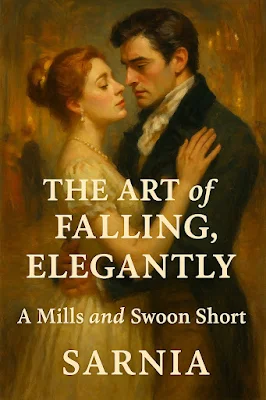The French Riviera was unseasonably warm and offensively smug.
Lady Honoria Bellweather had arrived with three trunks of silk, one cousin (mildly forgettable), and a vague desire not to get arrested....this time.
She had not, at any point, intended to seduce a Hungarian count. That simply happened.
Count Miklós Várady was, in her defence, tall, unreasonably bronzed, and cursed with the kind of accent that made even his hat sound suggestive. He was also in possession of a pastry yacht.
Lady Honoria Bellweather had arrived with three trunks of silk, one cousin (mildly forgettable), and a vague desire not to get arrested....this time.
She had not, at any point, intended to seduce a Hungarian count. That simply happened.
Count Miklós Várady was, in her defence, tall, unreasonably bronzed, and cursed with the kind of accent that made even his hat sound suggestive. He was also in possession of a pastry yacht.
“Do you mean a yacht for pastries or a pastry in the shape of a yacht?” she’d asked, suspicious.
“Both,” he had replied, with a smirk that had probably unbuttoned dozens of corsets across Eastern Europe.
The trouble began, naturally, with a tart. Not Honoria this time (though the local bishop would argue otherwise), but an actual lemon tart served during the Ambassadors’ Gala at Villa Les Oiseaux, a soirée so exclusive even the waiters required breeding.
One minute, the tart sat proudly atop a silver salver, lemon curd glistening like a debutante’s tears. Awaiting it's fate to be sliced, divided, and conquered. The next, it was gone.
Not sliced. Gone. Not a crumb, not a whiff of tangy lemon...gone.
An uproar ensued. A Spanish diplomat fainted. A baroness accused her husband of "culinary sabotage." Honoria, somewhat tipsy on crème de violette, leaned toward the count and said, “You haven’t hidden it in your trousers, have you?”
“No,” he said, scandalised. “This is tailored.”
Later that evening, as diplomats sulked and waiters were interrogated with unkind cheeses in the pantry, Honoria took matters into her own gloved hands. She cornered Miklós near the ornamental fish pond and whispered, “You stole that tart, didn’t you?”
He smiled enigmatically. “What would you do if I had?”
“I would be forced,” she said, removing one glove with delicate menace, “to punish you.”
“Ah,” he murmured, stepping closer. “You are English.”
The affair escalated rapidly.
By morning, Honoria was declared “missing” by her cousin, who had been too busy making eyes at a Sardinian botanist to notice her disappearance.
She was, in fact, on the pastry yacht, anchored discreetly off the coast, half-naked and thoroughly unrepentant.
“So where is the tart?” she asked, wrapped in a silk robe of questionable origin.
Miklós reached beneath the settee and produced it: flawless, unspoiled, perched on its little gold doily.
“I couldn’t allow anyone else to eat it,” he said.
“Because?”
“Because it was named after you.”
Naturally, there was fallout.
The British consul received a formal complaint involving patisserie theft, indecency, and a diplomatic insult involving a suggestive napkin fold. I saw it, and yes, it was falic, one couldn't argue.
"If you have never had a pastry eaten from your lower regions you haven't lived," Honoria explained to the horrified ladies at the Sunday cricket match. It wasn't her fault, there was gin and a very good loocking waiter.
Honoria, once returned to shore (and clothed), blamed sunstroke and a misinterpretation of Hungarian dessert etiquette.
Miklós vanished shortly after, last seen boarding a steamer bound for Tangier with a violin case and a twinkle of mischief.
He left Honoria one thing: the tart, now immortalised in oil on canvas, delivered to Bellweather Hall under the name:
Portrait of a Lady in Lemon.
Honoria, once returned to shore (and clothed), blamed sunstroke and a misinterpretation of Hungarian dessert etiquette.
Miklós vanished shortly after, last seen boarding a steamer bound for Tangier with a violin case and a twinkle of mischief.
He left Honoria one thing: the tart, now immortalised in oil on canvas, delivered to Bellweather Hall under the name:
Portrait of a Lady in Lemon.
The End
© 2025 Sarnia de la Mare for Mills and Swoon




